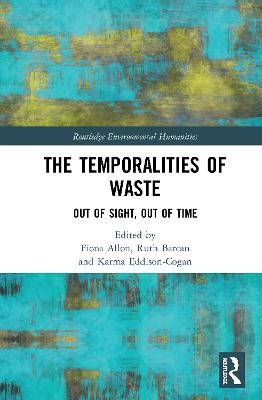
The Temporalities of Waste
Routledge (Verlag)
978-0-367-32179-6 (ISBN)
This book investigates the complex and unpredictable temporalities of waste. Reflecting on waste in the context of sustainability, materiality, social practices, subjectivity and environmental challenges, the book covers a wide range of settings, from the municipal garbage crisis in Beirut, to food rescue campaigns in Hong Kong and the toxic by-products of computer chip production in Silicon Valley.
Waste is one of the most pressing issues of the day, central to environmental challenges and the development of healthier and more sustainable futures. The emergence of the new field of discard studies, in addition to expanding research across other disciplines within the social sciences, is testament to the centrality of waste as a crucial social, material and cultural problem and to the need for multi- and transdisciplinary approaches like those provided in this volume. This edited collection seeks to develop a framework that understands the material properties of different kinds of waste, not as fixed, stable or singular but asdynamic, relational and often invisible. It brings together new and cutting-edge research on the temporalities of waste by a diverse range of international authors. Collectively, this research presents a persuasive argument about the need to give more credence to the capacities of waste to provoke us in materially and temporally complex ways, especially those substances that complicate our understandings of life as bounded duration.
This book will be of great interest to students and scholars of the environmental humanities, cultural studies, anthropology and human geography.
Fiona Allon is Senior Lecturer in the Department of Gender and Cultural Studies at the University of Sydney and an affiliate of the Sydney Environment Institute. Ruth Barcan is Associate Professor in the Department of Gender and Cultural Studies at the University of Sydney and a Sydney Environment Institute Key Researcher. Karma Eddison-Cogan is a PhD candidate in the Department of Gender and Cultural Studies at the University of Sydney.
Foreword, Myra J. Hird Introduction: Out of joint: the time of waste, Fiona Allon, Ruth Barcan and Karma Eddison-Cogan Part 1: Speed and Slowness 1. Open Crowd: just-in-time food rescue, Daisy Tam 2. Fridges and food waste: an ethnography of freshness, Rebecca Campbell and Gordon Waitt 3. Chip, body, earth: toxic temporalities of Intel Processor production, Luke Munn Part 2: Bureaucratic time 4. Bio-political temporalities of waste and the municipal collection schedule in the United States, Raysa Martinez Kruger 5. Housing waste in remote Indigenous Australia, Liam Grealy and Tess Lea 6. The imaginaries of Beirut’s ‘invisible’ solid waste: exploring walls as temporal pauses amidst the Beirut garbage crisis, Christine Mady Part 3: Disposability and persistence 7. "All of them had been forgotten": the temporality of wasted life in contemporary Arab fiction, Tasnim Qutait 8. Lingering matter: materialities, temporalities and everyday forms of waste, Elyse Stanes 9. The landfill paradox: reflections on the temporalities of waste, Yusif Idies Part 4: Long durée and intergenerational time 10. The waste of time, Elizabeth Graham, Dan Evans and Lindsay Duncan 11. Crip Time and the toxic body: water, waste and the autobiographical self, Ally Day 12. Wasting seas: oceanic time and temporalities, Elspeth Probyn Part 5: Collisions and multiplicity 13. Today’s waste is tomorrow’s future: on the temporalities of two post-nuclear sites, Aleksandra Brylska 14. Toxic transmogrification: Rare Earthenware as junk art, Sabine LeBel 15. Crunch time: temporalities of scrap metal collection, Steven Kohm and Kevin Walby Part 6: Revivals and returns 16. New temporalities of everyday life in Australian suburbia: cultural and material economies of hard rubbish reuse, Tania Lewis, Rowan Wilken and Frédéric Rauturier 17. Temporal cycles of waste management in Southern African Indigenous societies, Soul Shava and Rob O’Donoghue
| Erscheinungsdatum | 02.11.2020 |
|---|---|
| Reihe/Serie | Routledge Environmental Humanities |
| Zusatzinfo | 2 Tables, black and white; 17 Halftones, black and white; 18 Illustrations, black and white |
| Verlagsort | London |
| Sprache | englisch |
| Maße | 156 x 234 mm |
| Gewicht | 453 g |
| Themenwelt | Naturwissenschaften ► Biologie ► Ökologie / Naturschutz |
| Sozialwissenschaften ► Ethnologie | |
| Sozialwissenschaften ► Soziologie | |
| Technik ► Bauwesen | |
| Technik ► Umwelttechnik / Biotechnologie | |
| ISBN-10 | 0-367-32179-3 / 0367321793 |
| ISBN-13 | 978-0-367-32179-6 / 9780367321796 |
| Zustand | Neuware |
| Informationen gemäß Produktsicherheitsverordnung (GPSR) | |
| Haben Sie eine Frage zum Produkt? |
aus dem Bereich


